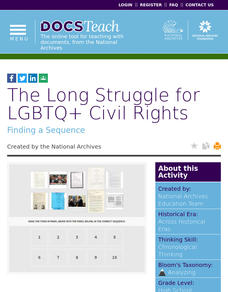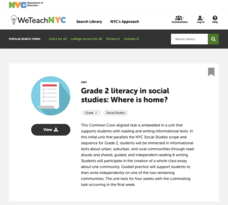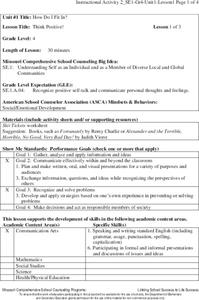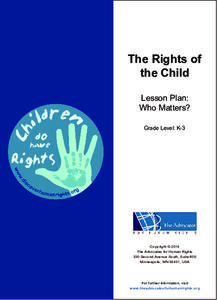Nemours KidsHealth
HIV and AIDS: Grades 9-12
Two activities help high schoolers learn about HIV and AIDS. First, groups read and discuss articles that provide information about sexually transmitted diseases and conduct further research to gather current information. They then...
Health Smart Virginia
Mindful Yoga Introduction
Middle schoolers apply what they learned in the previous lesson about mindful yoga to design a project to help a teen cope with a stressful situation in a healthy way. Groups role play explaining the benefits of their approach and...
Health Smart Virginia
Ending the Silence on Mental Illness
To end the silence on mental illness, groups research a mental illness. They then create a scene-by-scene script, cast parts, and record a video that details the symptoms, causes, and treatment of the disorder. They also include what...
Newseum
Photo Ethics: Diversity
With the advent of photo manipulation software, it is possible to digitally edit a photograph in a way that is virtually undetectable. The question asked of young journalists in this lesson is whether such manipulation is ethical. Groups...
DocsTeach
The Long Struggle for LGBTQ+ Civil Rights
Academics analyze 10 primary documents and photos to create a timeline of the LQBTQ+ movement. The activity includes an online worksheet. Scholars also participate in a group discussion to understand the long struggle the LGBTQ+...
Franklin D. Roosevelt Presidential Library & Museum
Pearl Harbor Activity #5: The Medium Matters
Young journalists learn that how we get our news and information matters in a collaborative social studies activity. The class is divided into three groups with the first analyzing a transcript of FDR's "Day of Infamy" speech, the second...
Academy of American Poets
Teach This Poem: “Making History” by Marilyn Nelson
What makes an event newsworthy, worth a reference in a news magazine or textbook? Who decides? These are questions Marilyn Nelson asks readers of her poem "Making History" to consider. To begin, class members list details they notice in...
Overcoming Obstacles
Being Assertive
Passive! Aggressive! Assertive!. The activities in the fourth lesson in the Communication module teach middle schoolers the difference among these behaviors and how to develop assertive communication skills. After defining and offering...
Learning for Justice
Standing Up Against Discrimination
Expert groups investigate five teens who stood up against discrimination they faced and then report their findings in jigsaw groups. The class drafts proposals for actions the school could take to stop discrimination.
Beyond Benign
Climate Change Chemistry
Assist your class with learning the importance of caring for our environment as they complete this fun-filled lesson on climate change. Individuals perform simulations related to greenhouse gases, atmospheric gases, and the overall...
New York City Department of Education
Grade 2 Literacy in Social Studies: Where Is Home?
What makes a community? How communities differ? Young scholars research different types of communities, small rural towns, and large crowded cities. They respond to writing prompts, and write essays in groups to understand the wide...
NOAA
Are You Climate Literate?: Play the Essential Principles Challenge
Installment eight of the 10-part Discover Your Changing World series tests the class's understanding of climate. Scholars play alone or in small groups to assess their understanding of climate systems, causes of climate...
Roy Rosenzweig Center for History and New Media
American Indians and their Environment
People could take a page in ingenuity and survival from the Powhatans. Deer skins became clothes, and the members of the Native American group farmed the rich Virginia soil and hunted in its forests for food. Using images of artifacts...
EngageNY
Final Performance Task: Becoming Visible Again
It's task time! Scholars complete the final lesson plan of the unit by completing a performance task. Readers begin in groups, working on a task card. Once complete, they move to an independent task, writing responses to a prompt about...
EngageNY
End of Unit Assessment: Making Connections between Song Lyrics and Texts
For the end-of-unit assessment, scholars engage in small group Socratic seminars to connect the lyrics of two songs to texts they read and studied. They discuss how the songs "Ain't Gonna Let Nobody Turn Me Around" and "Lift Every Voice...
Farmington Public Schools
British Literature Honors: Beowulf
Whether new to teaching Beowulf or an experience pro, you'll find much to like in a richly detailed unit plan that asks readers to consider how the epic represents the difficulty in defining good and evil but also reflects the changing...
Missouri Department of Elementary
Think Positive!
Following an attention-grabbing read-aloud, scholars brainstorm ways they can change negative thoughts into positive thoughts. Small groups plan and perform a skit that showcases one of the new ideas to uplift one's feelings....
Judicial Branch of California
Our Government Today…What A System!
A group of citizens in North Canada has decided to leave their country, and they are asking for help in setting up an American-style democracy. Using a carefully structured activity, pupils lay out the principles in the American...
EngageNY
Discussing and Identifying Themes: What Makes a Good Children’s Book?
Working in small groups, scholars look closely at a children's book to evaluate narrative techniques. Next, they complete a Children's Book Scavenger Hunt worksheet to analyze the literary elements of their selected stories.
Teach Engineering
Keep Your Boat Afloat
Use whatever material floats your boat. Working in groups, scholars decide on a type of metal and a type of coating to use for building a boat. They test their creations by leaving their boats in a pool of water for several days before...
Advocates for Human Rights
The Rights of the Child
Dr. Seuss wrote " A person's a person, no matter how small." The elementary resource uses Dr. Seuss's book Horton Hears a Who to explore children's rights in an engaging way. Young academics listen to the story, participate in group...
Smithsonian Institution
What's the Code? Coding Robot Movements Using Sound
Tap into the desire to learn about computer codes. Pupils apply the Tap Code and the Polybius Square to send secret codes using sound. They design a code that tells a robot what movements to make and then test out their code using one of...
Smithsonian Institution
Trait Tracker
Help mice beat the odds with an exciting activity about traits. Biologists discover the role of diet and other factors on animal traits by participating in a simulation activity. Teams collect and evaluate data to understand how certain...
Livaudais-Baker English Classroom
Lord of The Flies Chapter Questions
Chapter-by-chapter worksheets ask readers to find specific examples of characterization, symbolism, setting, conflict, themes, and main ideas in William Golding's Lord of the Flies. Also included in the packet is an assignment sheet that...
Other popular searches
- Food Groups
- Ethnic Groups
- Self Esteem Group Activities
- Mental Health Group Activity
- Group Work
- Cooperative Groups
- Equal Grouping
- Interest Groups
- Ethnic and Minority Groups
- Pe Games Large Groups
- Five Basic Food Groups
- Five Food Groups























